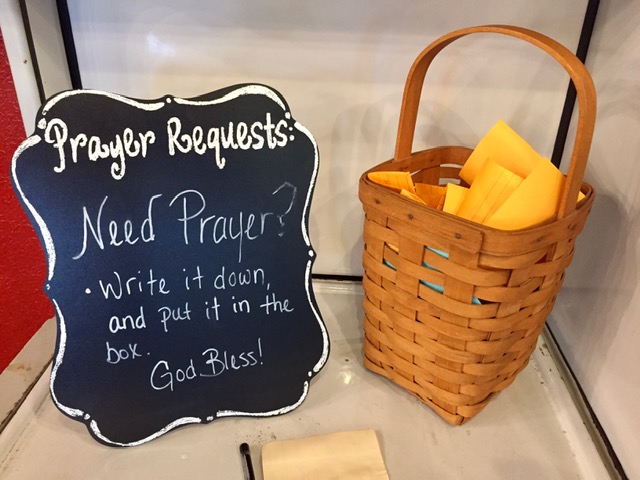| Beware the Gnats
|
|
| Thursday, July 04, 2019 | |
Out at the camper, we inherited somebody else's deck. With the help of a lot of friends—and a John Deere tractor—we managed to move two 8x8 foot wooden sections to our site. The repurposed deck then got a thorough power-washing. The next step was…a step. Actually, we needed to build three sets of steps. Like most "morning" projects, the construction of those steps turned out to be an all-day affair. So I measured, sawed, and fastened, all the while vaguely aware of a cloud of gnats swirling and swarming. After taking a much-needed shower and changing into some comfortable clothes, I took a look in the mirror. More than 24 bites encircled my neck (yup, I counted). They grew red and slightly swollen—but didn't itch too severely. Looking back, it struck me as odd that I had worked the entire day with only a vague sense of their presence. That said, their bite marks were anything but vague. Amazing the damage a nearly invisible insect can inflict.
But isn't it also true of you and me that we cause the most damage to our treasured relationships—with small things? Am I the only one with a history of hurting loved ones with small grunts of ingratitude, tiny criticisms, snippets of cynicism? Haven't you found it true that you can often avoid the "big sins," but you cause great trouble with the small stuff—the gnats of life? Ecclesiastes 10:1 says, "Dead flies make the perfumer's ointment give off a stench." And James 3:6 points out that tiny tongue of yours is "a fire, a world of unrighteousness." We Christian folks have a history of warning our kind about the big sins of life. But I'm not sure we've adequately estimated the damage caused by "smaller sins." As they say, nobody ever woke up and decided to ruin their life—or someone else's. But it happens. A bit at a time. A bite at a time. Beware the gnats. |
|
| Pretzels and Prayers
|
|
| Thursday, June 27, 2019 | |
At Ben’s Pretzels, they mix flour, water, and salt—and make magic. At Ben’s Pretzels, they thank you for stopping by calling out, “Have a pretzel day!” At Ben’s Pretzels, you hear Christian music playing over the speakers and read Bible verses on the walls. No visit to Shipshewana, Indiana would possibly be complete without a pretzel at Ben’s. As I’m blessed with a wife who agrees, we recently sat down to a steamy hot twist slathered in butter and bursting with bits of crunchy crystal salt. Munching while marveling at this delectable (but hardly diet-worthy) treat, my eye caught sight of an antique stove. To be precise, it was a “Direct Action Lorain Oven Heat Regulator”—circa 1920s. Resting on top of its built-in pie rack were half a dozen Ball jars and two Bibles. Nestled directly on top of its modest stovetop surface, I saw a boxy looking basket, along with some Post-it notes and pens. A sign next to them read, “Need prayer? Write it down and put it in the box. God bless!” Know what? Quite a few people had written down prayer requests and put them in that basket.
Got me to thinking. What if Christian-owned businesses everywhere started doing that? What if Christian doctors had such a basket at the counter where you sign in for your appointment? What if Christian lawyers welcomed prayer requests in a basket in their front offices? Observe that with such a basket, nobody is preaching a sermon. Not even a sentence. Just offering to pray. I get that certain businesses face restrictions. I understand that for lots of reasons, lots of places couldn’t offer a prayer basket. But some could. Many could! So why not today? And if you don’t happen to own a business, why not offer to pray for someone you know is hurting? We can—and should—pray for and with our unsaved friends. Again—why not today? |
|
| This Had Better Be About the Bible
|
|
| Thursday, June 20, 2019 | |
When I first began preaching, I ran every sermon outline by my friend and mentor, Mike Kellogg of Moody Radio. Peering over his glasses, he matched his steely stare with a deep-throated warning I’ve never forgotten: “This had better be about the Bible.” Throughout my ordination process, that same truth chiseled itself into my soul. In truth, I still think about it every time I’m crafting a sermon outline. It is the yardstick I use to measure my own sermons—and those of others. A few weeks ago we traveled to Florida, our flight taking place during Sunday morning church hours. Later that day, my wife and I decided we’d watch a sermon on the iPad. I selected a pastor whose book was released by the largest Christian publisher in America. We listened carefully, expecting solid Bible content. But we heard precious little. There were many stories and many good points and lots of good truths to ponder. But most of the sermon could honestly have been transcribed and handed off for delivery by a secular self-help speaker. Now don’t get me wrong. I love stories. At heart, I am little more than a story teller. And stories are great. Jesus told tons of them. Yet when it comes to a Sunday morning message, I am keenly aware that my stories must never overshadow the Bible text, but instead, reinforce it or illustrate it. As a minister of the gospel, I am standing as God’s representative, opening God’s Word to God’s people. This ought to put a holy fear into the hearts of those of us who would presume to preach. Wondering if perhaps I was being a bit harsh on the iPad preacher, or if our initial impressions were wrong, I went back and watched that same sermon again—this time with a careful eye on the clock.
The sermon itself was 35:06 in length. I ran a stopwatch app, noting every single instance the preacher either read from the Bible, referenced a passage, or tried to explain the passage. The most generous of measurements shows a maximum of 6:25 of actual Bible content. Meaning just 19% of the message quoted or explained Scripture. In a day when 69% of churchgoers believe that everyone will go to heaven…In a day when 56% of churchgoers don’t believe that sharing their faith is an essential obligation of their Christian life...how can a sermon with 19% biblical content be okay? It isn’t! This Sunday, your church will feature a sermon. It had better be about the Bible
|
|
| Jack Takes on the ACLU
|
|
| Thursday, June 13, 2019 | |
“I seen ‘em way before I got to the intersection,” recalled my friend, Jack. “They were on the sidewalk just outside a Starbucks in downtown Chicago, waving iPads as they gestured.” I knew a story was brewing with Jack. There always is. “Who were they?” I asked, taking Jack’s bait. “At first, I wasn’t sure. Since I go that way a lot, I figured it was probably an environmental group like Sierra. You see them a lot. Young folks hungry for conversations and contributions—mostly the latter,” Jack chuckled. “So if it wasn’t Sierra, who was it?” “The ACLU. That’s who. Advocating to keep abortion legal.” “So did you engage them or avoid them?” “Actually, I wanted to yell at ‘em. But that’s already been done—and with little impact. Besides, it didn’t seem consistent with the What would Jesus do? bracelet I still wear. “Okay, so you didn’t yell, Jack. But what did you say?” “For a long time, I just listened to the guy who’d cornered me. I wanted him to get the sense that I cared about him as a human—-that I respected him. Everything in me wanted to argue. But honestly, I believe the Holy Spirit was reigning me in.” “Then what?” “Then came a pause in the conversation, and he asked me what I thought. I told him I had heard his perspective but was troubled by the medical reality that an unborn child has a beating heart and fingers and fingerprints very early on. To abort such a little one seemed cruel.” “Any response?” “He made it clear he was comfortable with the idea of taking the life of an unborn kid. It became obvious we were worlds apart in our thinking, and I knew things were drawing to a close when he stopped showing me stuff on his iPad.” “So how did it end, Jack?” “The conversation just naturally came to a close. But here’s the thing”—Jack stuck his finger in my face. “Nobody yelled. In fact, I even complimented the guy. Then we shook hands.” “Very cool, Jack.”
Very cool, indeed. In a culture that is as polarized as it is poisoned with vitriol, a follower of Jesus had a respectful conversation instead of a shouting match. That sounds quite a bit like something Jesus would do. Way to go, Jack! |
|
| Her Name is Agnes.
|
|
| Thursday, June 06, 2019 | |
Her name is Agnes. She misses her mother.
The shards of her broken life frame a story that redfines tragedy. I listened to bits and pieces as we sat in her third floor apartment outside of Chicago—a long way from her childhood home in Budapest, Hungary. At the age of eleven, she awoke to the sound of a gunshot in her front yard, announcing the arrival of German storm troopers. Black booted soldiers forced their way through the front door—in search of Agnes’ mother.
One week previously, the Nazis hauled away her father in a similar early morning assault after which he was forced into a large truck transport heading for a death camp. Ironically, the Nazis needed a Hungarian who spoke German to assist them with navigation. Agnes’ father was fluent, so he volunteered. Upon arrival, the Germans—perhaps as a thank you gesture—released him and he eventually made it back to Budapest.
November 20, 1944. Agnes recalls that her mother was “herded away at gunpoint, bundled up in her Persian lamb coat with a backpack containing mere necessities. She tried to put on a brave face as she kissed me goodbye.”
Agnes never saw her mother again. Not that she didn’t try. “For years, I walked up and down streets looking for her.” Nor was this to be Agnes’ only loss at the hands of the Nazis (her mother died of “natural causes” in a concentration camp.
On a cold winter night, they took her aunt and uncle. “Along with many others, they were taken to the shore of the icy Danube river where they were shot and left to die in the frigid water.”
Only later did she discover that their deaths at the banks of the river were as likely to be the result of drowning as gun fire. “As ammunition dwindled, the Nazis improvised by wiring several people together before firing one shot…killing as many as ten people with one shot. They had become masters at exterminating Jews.”
Peering into a black and white photo on the wall of her apartment, my eyes locked briefly with this couple whose lives were snuffed out. I try but cannot process any of this emotionally.
Proudly—and still with a smile—Agnes shows me a photo of her mother and father. The smiling little kid—the one without a care in the world—is Agnes. She lost that world nearly 75 years ago.
How could it be that 75 years later one man—Hitler—is still causing so much pain to people like this lady?
Her name is Agnes. She misses her mother. Still.
|
|
| Records per page First Prev 48 49 50 51 52 53 54 55 56 57 of 127 Next Last | |
 Jon Gauger Jon Gauger |
|||||||||||||||
| Thursday Thought | |||||||||||||||
|
|
|||||||||||||||
Recent Posts
|


